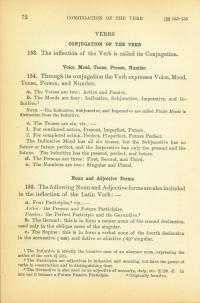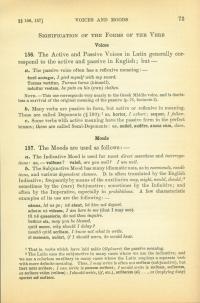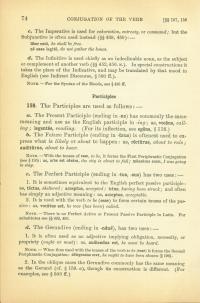153. The inflection of the Verb is called its Conjugation.
154. Through its conjugation the Verb expresses Voice, Mood, Tense, Person, and Number.
a. There are two Voices: Active and Passive.
b. The four Moods are: Indicative, Subjunctive, Imperative, and Infinitive.1
Note— The Indicative, Subjunctive, and Imperative are called Finite Moods in distinction from the Infinitive.
c. There are six Tenses.
For continued action: Present, Imperfect, Future
For completed action: Perfect, Pluperfect, Future Perfect
The Indicative Mood has all six tenses, but the Subjunctive has no Future or Future Perfect, and the Imperative has only the Present and the Future. The Infinitive has the Present, Perfect, and Future.
d.The three Persons are: 1st, 2nd, and 3rd.
e. The two Numbers are: Singular and Plural.
155. The following Noun and Adjective forms are also included in the inflection of the Latin Verb.
a. Four Participles.2
Active: the Present and Future participles
Passive: the Perfect participle and the Gerundive.3
b. The Gerund is a neuter noun of the 2nd declension in form, used only in the oblique cases of the singular.
c. The Supine: this is a verbal noun of the 4th declension in the accusative (-um) and dative or ablative (-ū)4 singular.
156. The Active and Passive Voices in Latin generally correspond to the active and passive in English with the following exceptions.
a. The passive voice often has a reflexive meaning.
Ferrō accingor. I gird myself with my sword.
Turnus vertitur. Turnus turns (himself).
Induitur vestem. He puts on his (own) clothes.
Note— This use corresponds very nearly to the Greek Middle voice, and is doubtless a survival of the original meaning of the passive (§ 163, fn 2).
b. Many verbs are passive in form, but active or reflexive in meaning. These are called Deponents (§ 190).5
Hortor. I exhort.
Sequor. I follow.
c. Some verbs with active meaning have the passive form in the perfect tenses; these are called Semi-Deponents.
audeō, audēre, ausus sum dare
157. The Moods are used as follows.
a. The Indicative Mood is used for most direct assertions and interrogations:
Valēsne? Valeō. Are you well? I am well.
b. The Subjunctive Mood has many idiomatic uses, as in commands, conditions, and various dependent clauses. It is often translated by the English Indicative; frequently by means of the auxiliaries may, might, would, should;6 sometimes by the (rare) Subjunctive; sometimes by the Infinitive; and often by the Imperative, especially in prohibitions. The following are a few characteristic examples of its use.
Eāmus. Let us go.
Nē abeat. Let him not depart.
Adsum ut videam. I am here to see (that I may see).
Tū nē quaesieris. Do not you inquire.
Beātus sīs. May you be blessed.
Quid morer? Why should I delay?
Nesciō quid scrībam. I know not what to write.
Sī moneam audiat. If I should warn, he would hear.
c. The Imperative is used for exhortation, entreaty, or command, but the Subjunctive is often used instead (§ 439 and § 450).
Līber estō. He shall be free.
Nē ossa legitō. Do not gather the bones.
d. The Infinitive is used chiefly as an indeclinable noun, as the subject or complement of another verb (§ 452 and § 456, Note). In special constructions it takes the place of the Indicative, and may be translated by that mood in English (see Indirect Discourse, § 580 ff.).
Note— For the Syntax of the Moods, see § 436 ff.
Footnotes
2. The Participles are adjectives in inflection and meaning, but have the power of verbs in construction and in distinguishing time.
3. The Gerundive is also used as an adjective of necessity, duty, etc. (§ 158.d). In late use it became a Future Passive Participle.
4. Originally locative.
5. That is, verbs which have laid aside (dēpōnere) the passive meaning.
6. Latin uses the subjunctive in many cases where we use the indicative; and we use a colorless auxiliary in many cases where Latin employs a separate verb with more definite meaning. Thus, I may write is often not scrībam (subjunctive), but licet mihi scrībere; I can write is possum scrībere; I would write is scrībam, scrīberem, or scrībere velim (vellem); I should write, (if, etc.), scrīberem (sī) . . . or (implying duty) oportet mē scrībere.



